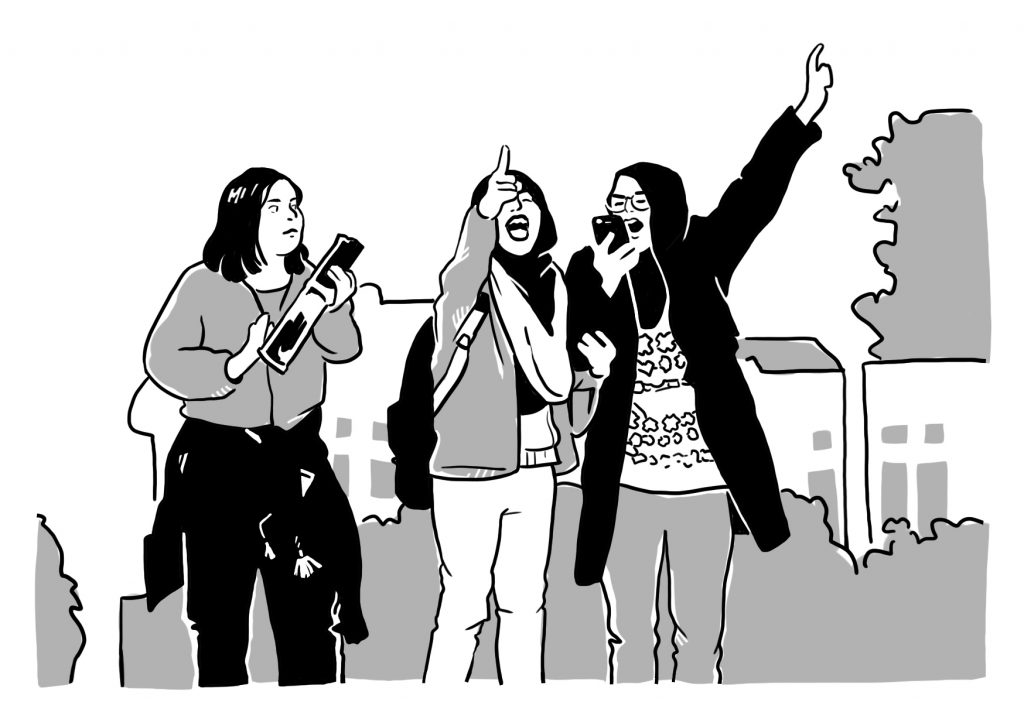Women agricultural workers in Tunisia continue dying on the road due to hazardous transport conditions. A deeper look, however, reveals that solving the transport predicament alone is just a band-aid solution to an issue wherein extreme precarity, systemic sexism, and externally imposed austerity are entangled.
Establishing equality in inheritance between men and women in 2018 was perhaps the biggest move toward championing Tunisian women’s rights under President Mohamed Beji Caid Essebssi’s leadership. This landmark decision reinforced Tunisia’s reputation in the Middle East and North Africa (MENA) region as a progressive nation with avant-garde feminist legislations. While many celebrated the decision for advancing women’s rights in the country, inheritance equality was seldom a pressing matter for poor women working in Tunisia’s shadow economy. This is endemic of many women-targeted policies in Tunisia: they cater toward highly educated women from the upper socio-economic class, leaving behind poor women working informally in rural areas.
Deathly Journeys for Rural Women Workers
Women agricultural labourers – who make up 58% of Tunisian farmhands – often work in remote farms and require transportation not provided by the state. Farm owners fetch the women in light-duty trucks where they are transported sitting or standing in the open cargo area. The women report hazardous ‘cattle-like’ journeys, the costs of which are extracted from their wages. On average, these workers earn ten Tunisian Dinars less than their male counterparts. Generally, they are regarded as an easily exploitable demographic in a labour-intensive sector with inadequate regulatory oversight.
In April 2019, the inevitable occurred: 12 women farm workers were killed and 20 were injured in a road accident in the Sidi Bouzid region, one of the most economically marginalised regions in Tunisia. This tragedy was not an isolated incident. The Tunisian Forum for Economic and Social Rights recorded 40 deaths and 530 injuries among women rural workers between 2016 and 2020 because of dangerous and unregulated transportation conditions of the so-called ‘death vans.’
The persistent deaths of poor women workers betray the widely (and falsely) held fantasy of Tunisia’s exceptionalism vis-à-vis women’s liberation. To better grasp the plight of women agricultural workers in inner Tunisia, an examination of their compounded marginalisation is necessary. Served on a platter of structural adjustment policies, Tunisian women have been delivered a diluted ‘feminism’, one entirely divorced from social justice and mass worker mobilisation.
Situating the Ministry of Women Against the Backdrop of IMF Policies:
Tunisia’s economic liberalisation in the 1980s relied on easily accessible and cheap labour provided primarily by women from low socioeconomic and low educational backgrounds. Yet, following the 2011 revolution, reforms focused on tackling unemployment of those with higher education at the expense of those without. The Ministry of Women, Social Affairs, Children, and the Elderly heavily promoted entrepreneurship, micro-loan and credit programmes to well-educated unemployed women, hoping that their endeavours would yield higher employment of less-educated women via a ‘trickle-down empowerment’ of sorts. This is despite evidence that such programmes, besides leading to household over-indebtedness, circumvent the problem of inadequate employment and unemployment without addressing their root causes.
Nevertheless, the Ministry’s entrepreneurship-obsessed policies must be contextualised within Tunisia’s agreement with the International Monetary Fund (IMF) for a $2.9 billion bailout for its development plan 2016-2020. While not focused per se on ‘women empowerment’, the plan would ideally indirectly boost women’s entrepreneurship. Among others, the arrangement demanded wage restraint, subsidy reform, reducing state interventionism. Post-2011, the IMF called for an increase in women’s labour force participation in Tunisia, but curiously neglected to address the absence of decent work conditions (like safe transportation) or the deeply entrenched gender inequities pushing women to low-paid, high-risk jobs. In fact, the IMF 2016 deal led to a severe austerity in Tunisia still felt today. It effectively shrunk education expenditure and healthcare funding by 10% and 1.6% respectively, disproportionately harming Tunisian women in the long run. Most importantly, these imposed cuts to public expenditure downsized the Tunisian public sector, where women gravitate to work, pushing them to the private sector where adequate oversight lacks, and labour abuses thrive.
Unsurprisingly, the largest Tunisian trade union fervently opposed IMF’s structural adjustment reforms. While women farm workers must be understood as a demographic marginalised by neoliberal arrangement pushed by International Financial Institutions (IFIs), failure at home must not be overlooked.
Response by the UGTT
News of the April 2019 tragedy alerted the Tunisian General Labour Union (UGTT) who reacted by mobilising crowds in Sidi Bouzid to protest presumed negligence by the Tunisian government. The UGTT, which has been a harsh critic of the former Tunisian government’s proposed economic reforms, orchestrated sit-ins, through which it galvanised public outrage and channelled people’s grievances in Sidi-Bouzid. Critics, however, insist that the UGTT has instrumentalised the accident to score political points. Other sceptical voices denounce its long history of gender-blind organising, having ignored the plight of women agricultural workers prior to April 2019. Despite women’s significant contributions to the union’s labour movement, no woman has ever held a leadership role in the UGTT. The Union’s history also reveals a culture of machismo amongst its leading ranks and exclusion of women from vital decision-making processes. Nevertheless, women’s occupation of influential positions should not be equated with the enfranchisement of all womankind.
Act 51 & Response by Civil Society
Under mounting pressure, the government introduced Act 51 in 2019 to legally solidify the category of “transport of farm workers”, aiming to regulate the conditions of all farm workers who rely on informal transportation. The law stipulates the fare for transportation as well as the conditions for granting licenses to these drivers. It specifies the characteristics of the means of transport and obliges vehicles used for this purpose to be registered as such. Yet, since the law went into effect, more women farm labourers have died during their transport, prompting civil society and grassroots women’s organisations to criticise the government for passing laws without seeking oversight to ensure their implementation.
On the first anniversary of the ratification of Act 51, numerous grassroots associations launched the “Salma Taaich” (Arabic for “Living Safe”) campaign to monitor its implementation and to advocate for safer transport for women farm workers. While the coalition considers the said Act an important step to better regulating the sector, it reaffirms that improving the transport conditions of women farm workers remains conditional on the amelioration of their overall economic reality.
Learning from Past Policy Failures
Recurring images of Tunisian politicians during re-election season distributing food and clothing to poor rural women is revelatory of how the tokenisation of poor women’s struggle has imbued the Tunisian political landscape. Between a labour union that only acts when prompted by tragedy and an indebted government operating under the thumb of IFIs, women agricultural workers need transformative policies that appreciate their situation for what it truly is: a gendered precarity operating at the nexus of class and regionalism.
It is time to move beyond policies pushing for entrepreneurship as a panacea to all economic ailments. Alleviating financial poverty without addressing systemic sexism will inevitably fall short however favourable legislation may appear. It would be naïve to conceive of the women workers’ struggle as limited to dangerous transport while ignoring harsh working conditions, predatory wages, difficulties accessing social security services, and household violence, for example.
Moving forward, the Tunisian government must formalise women’s agricultural work by regulating and controlling the sector. This would offer security to workers by protecting them from wage theft, accidents at work, and arbitrary sackings. The government, notably the Ministries of Transport and Women, should also liaise with civil society, particularly the “Salma Taaich” coalition, to coordinate efforts and better understand their target demographic. Additionally, the UGTT must dispense its political influence and support women to better organise as a group and harness their collective bargaining power. Without a collective struggle that merges both feminism and the labour movement, it is doubtful that the predicament of women rural workers will change.
 Dhouha is candidate for an MPP. She is currently completing a Professional Year at the GIZ Delegation to the African Union in Addis Ababa, Ethiopia where she is coordinating the African Network for Women in Infrastructure (ANWIN). Dhouha is interested in public service provision and exclusion at the nexus of gender, race and economic class in postcolonial Africa. In her spare time, she collects vintage Soviet-era books.
Dhouha is candidate for an MPP. She is currently completing a Professional Year at the GIZ Delegation to the African Union in Addis Ababa, Ethiopia where she is coordinating the African Network for Women in Infrastructure (ANWIN). Dhouha is interested in public service provision and exclusion at the nexus of gender, race and economic class in postcolonial Africa. In her spare time, she collects vintage Soviet-era books.
